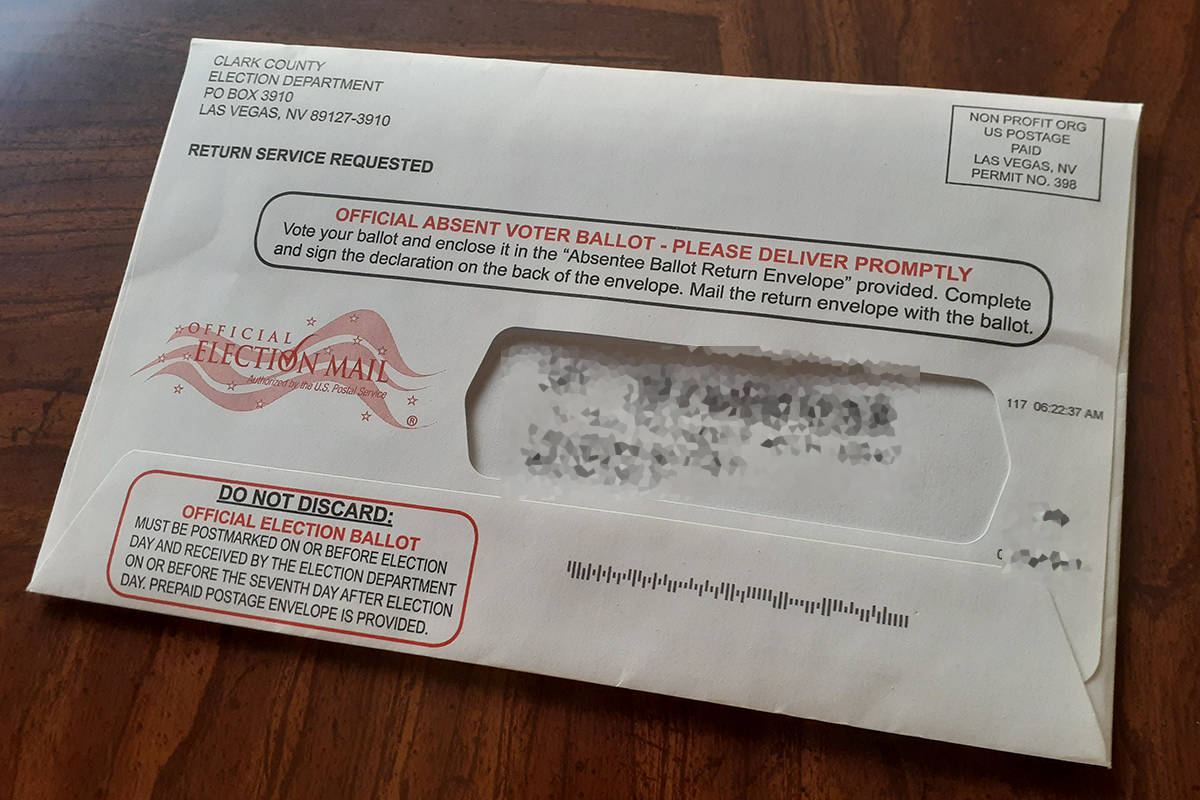Nevada Senate OKs mail-in election bill on party-line vote
CARSON CITY — The state Senate on Sunday approved a controversial bill to provide for a mostly mail-in election in November over the objections of Republicans who decried the risks of fraud and delayed counting of ballots.
But Democrats contended that the election measure, Assembly Bill 4, was needed because of persistent concerns that the COVID-19 pandemic makes the act of standing in long lines to vote a significant public health issue.
The vote was 13-8, with every Republican voting no.
“The truth is this bill only allows more Nevadans to participate safely in our general election in Nevada,” said Sen. Dallas Harris, D-Las Vegas.
The bill also caught the attention of President Donald Trump, who took to Twitter on Sunday to again denounce mail-in balloting. The president responded to a viral tweet Saturday from former Republican Nevada Attorney General Adam Laxalt lambasting the plan.
This is outrageous. Must be met with immediate litigation! @GOPChairwoman https://t.co/CD6bD3Kn6J
— Donald J. Trump (@realDonaldTrump) August 2, 2020
The tweet drew a quick rebuke from state Democrats, with party Chair William McCurdy II noting that both Trump and Laxalt have voted by mail.
“Trump and his allies have always been motivated by partisanship, even at the expense of American lives,” McCurdy said in a statement. “That he would threaten Nevada Democrats’ work to protect voting access through a crisis of his own making is both despicable and par for the course.”
The Democratic legislative leadership also replied to the president and Republican National Committee Chairwoman Ronna McDaniel, calling their attacks on the bill “fear mongering” and an attempt to distract from the president’s missteps and deflections in responding to the virus.
“This bill ensures every eligible voter in the state is able to cast his or her ballot safely and securely without risk to their health,” Assembly Speaker Jason Frierson and Senate Majority Leader Nicole Cannizzaro said in a joint statement.
AB4 is an omnibus measure modifying election procedures during periods of declared emergency in Nevada, such as currently exists from COVID-19. Broadly, it makes it easier for people to vote without physically going to a polling place; creates more flexible procedures for accepting mail-in ballots, including the collection, or “harvesting,” of ballots for drop-off; and makes changes to help elections officials tabulate the vote. It also allocates $3 million in federal pandemic aid to pay for mail-in ballots for this year’s general election.
Republicans, including Secretary of State Barbara Cegavske, who ordered mail-in balloting for the June primaries, opposed the measure. In earlier testimony on the bill, Cegavske noted there were no complaints of fraud in the primary.
No hanging chads
Senate Minority Leader James Settelmeyer, R-Minden, said that the provision for ballot collection could influence how some people vote and that the bill’s provisions could last indefinitely if a state of emergency is not lifted. Mail-in ballots also would delay the count, he said.
“I don’t necessarily want to be the hanging chad situation of Florida and not know leader of the free world for weeks because we haven’t figured that out yet,” he said. “And I think that bill does just that.”
Democrats noted that the bill does not do away with voting in polling places, either in early voting or on Election Day. The bill preserves “that opportunity, and it intends to make sure that nobody loses their right to vote because they’re asked to stand in line for a significant amount of time,” said Sen. Julia Ratti, D-Sparks, the assistant majority leader.
Sen. Pat Spearman, D-North Las Vegas, said as a descendant of former Black slaves, she backed the bill “because although I am third-generation free, I am only the second generation to have in law the right to vote. That’s sacred to me.”
State Republicans chimed in following the vote, with Party Chairman Michael McDonald calling the measure “a dangerous bill.”
“By throwing the integrity of the election results into question through mandating ballots be sent to all voters and legalizing ballot harvesting, Nevada Democrats have proven to be a callous and careless majority that is drunk on power,” he said.
The bill now goes to Gov. Steve Sisolak for his approval. He’s expected to sign it.
With AB4, the Senate also approved:
■ Assembly Bill 1, which makes technical corrections to three bills passed in the 2019 session: one restoring voting rights to convicts immediately upon release from prison, the second extending the time frame for tenant evictions and the third regulating internet business lenders. It passed 18-3, with Sens. Scott Hammond, R-Las Vegas, Ira Hansen, R-Sparks and Settelmeyer in opposition. The bill now goes to the governor.
■ Assembly Bill 2, which makes changes to allow lawmakers attend and participate in interim committees remotely and creates penalties for people who try to hack or otherwise interfere with remote meetings. (Rules for regular and special sessions are set by the Legislature when they convene.)
It also expedites how proposed constitutional amendments approved by lawmakers in special sessions convened in election years move to the ballot. Normally, such proposals must be approved by legislatures that convene in odd-numbered years. It passed 15-6, with Sens. Pete Goicoechea, R-Eureka, Hammond, Hansen, Joe Hardy, R-Boulder City, Keith Pickard, R-Henderson, and Settelmeyer voting no. The bill goes to the governor.
■ Senate Bill 1 authorizes courts to stay eviction proceedings for up to 30 days in favor of an alternate dispute resolution. It passed 18-3, with Hammond, Hansen and Pickard voting no. The bill moves to the Assembly.
Contact Capital Bureau reporter Bill Dentzer at bdentzer@reviewjournal.com. Follow @DentzerNews on Twitter. Contact Capital Bureau Chief Colton Lochhead at clochhead@reviewjournal.com. Follow @ColtonLochhead on Twitter.


















